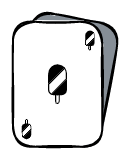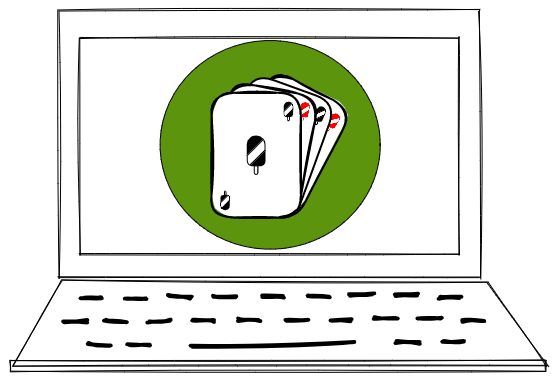Let’s Teach Crossplane to Play Poker
The Penguin Book of Card Games lists over 250 games which can be played with a standard deck of playing cards. Most of those games don’t require any changes to the deck. Blackjack, poker, gin, go fish, crazy eights, old maid… these games all use the same 4 suits of 13 ranks.
When we start composing infrastructure with Crossplane, it’s a lot like learning a new game with playing cards. We know the pieces. We know what they do. What we need to learn is how we’re going to arrange them to play a new game.
In this demo, I’m going to walk through an example Crossplane Configuration Package Development Cycle. Along the way I’m going to use some of the tools I’ve talked about in previous posts. And I’m going to demystify some of the concepts around Crossplane Composition.
I’m going to do this by teaching Crossplane to Play Poker.
Let’s get Started!
You can find a complete example of this tutorial in the A Tour of Crossplane repo.
Prerequisites
We’re going to assume you have the following installed:
Provider-Cards
To play a game, we need cards. We built a custom provider, provider-cards, which will give us a complete deck of standard playing cards to work with.
We will install the provider when we install crossplane with a uxp-values.yaml file. We store this file under tests/ so it can be re-used in our kuttl test bootstrapping:
tests/uxp-values.yaml:
provider:
packages:
- registry.upbound.io/aaroneaton/provider-cards:v0.0.1
Set up a Casino
Launch a kind cluster and install crossplane:
kind create cluster --name cards
up uxp install -f tests/uxp-values.yaml
Open a New Deck and Give it a Shuffle
We open a new Deck by creating a ProviderConfig, and we shuffle it with a Secret. Every ProviderConfig represents a new set of 52 playing cards. The provider will only issue one card of each type (say, the ♥10) for each ProviderConfig.
We aren’t going into too much detail about Providers here. If you are looking for more information, take a look at the crossplane docs.
Apply the following manifests to get a new deck:
tests/init.yaml:
---
apiVersion: v1
kind: Secret
metadata:
namespace: upbound-system
name: tour
type: Opaque
stringData:
credentials: |
{ "seed": 1 }
---
apiVersion: providercards.aaroneaton.com/v1alpha1
kind: ProviderConfig
metadata:
name: tour
spec:
credentials:
source: Secret
secretRef:
namespace: upbound-system
name: tour
key: credentials
And apply it to your cluster:
kubectl apply -f tests/init.yaml
Now we can play with our cards.
Lesson One: Cards are Managed Resources
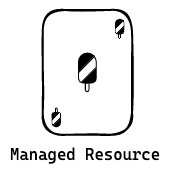
Crossplane is built to operate Managed Resources. Today, the Managed Resources we are going to use are Cards.
Let’s pull one card off the top of the deck:
---
apiVersion: providercards.aaroneaton.com/v1alpha1
kind: Card
metadata:
name: acard
spec:
forProvider: {}
providerConfigRef:
name: tour
You can check the value of acard by running the following:
kubectl get card acard -o jsonpath='{@.status.atProvider.face}'
You should see ♥10 in your output. Because we declared the seed, we can predict the output. (Golang lists do not guarantee order, though, so if I’m wrong… sorry.)
You can deal more cards and see how they each behave. When you’re ready, put all the cards back in the deck with:
kind delete cluster --name cards
What Makes a Crossplane Composition
Whether you’re playing Poker, or Blackjack, or Solitaire the actual cards do not change. What changes is how the cards are moved around the table. How many cards are dealt to each player, which cards are showing, which cards are shared on the table. Is there a discard pile? Do we need to “pass” cards (as in Hearts)?
These are the rules of the Game. When we understand and agree on the rules of the game, we can build tools that make playing the game easier and more fun.
Let’s make sure we all know and agree on the game we are playing.
The Rules of Poker (Texas Hold’em Style)
Texas Hold’em is played in four rounds. In each round, we are going to deliver new cards to the table.
This is what a game of Texas Hold’em looks like:
- Players sit at the table and request a hand. A Hand is made up of two cards. Players can only see their own cards (no cards are face up).
- Once all players have their hand, the dealer will deal the flop. The Flop is made up of one burned card (not shown to anyone at the table) and three face-up cards on the table. All players can view the faces of the flop.
- After a round of betting, the dealer will deal the turn. The Turn is made up of one burned card and one face-up card. Again, all players can see the face of the turn.
- After another round of betting, the dealer will deal the river. The River is made up of one burned card and one face-up card. All players can see the face of the river.
In the steps above I have highlights all of the objects which are made out of cards. These objects represent Composite Resources, which we will build in the next section.
The Composite Resources we are going to build are:
- A Player Hand (2 private cards for each player)
- The Flop (1 burned card, 3 shared cards)
- The Turn (1 burned card, 1 shared card)
- The River (1 burned card, 1 shared card)
How do we bet?
We do not bet with cards. In order to implement Composites for betting, we would need provider-chips or provider-toothpicks. For now, we’ll assume our players are betting by some other means.
What about scoring?
We do not score with cards, either. In this demo, we are assuming everyone is familiar with the rules of poker, and we want to make it faster and easier for them to play it.
Whether a straight-flush beats a full-house is something the players will need to agree on.
Let’s start building our game.
A PlayerHand is a Composite Resource
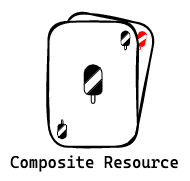
A Composite Resource is container for multiple other Resources. It can contain Managed Resources from a provider, managed resources from non-Crossplane controllers, or native Kubernetes resources (pods, configMaps, etc).
In shorthand we often refer to Composite Resources as “XRs”.
We Start by Defining the Output
The PlayerHand Composite will generate 2 private cards that only the player can see.
The private Cards will be created at Cluster-Scope, but their Face values will be added to a secret in the Player’s Namespace.
Let’s create a kuttl test which defines this output:
tests/playerhand/00-assert.yaml:
apiVersion: kuttl.dev/v1beta1
kind: TestAssert
timeout: 30
---
apiVersion: providercards.aaroneaton.com/v1alpha1
kind: Card
metadata:
name: playerone-01
spec:
forProvider: {}
providerConfigRef:
name: tour
---
apiVersion: providercards.aaroneaton.com/v1alpha1
kind: Card
metadata:
name: playerone-02
spec:
forProvider: {}
providerConfigRef:
name: tour
---
apiVersion: v1
kind: Secret
metadata:
name: my-cards
type: connection.crossplane.io/v1alpha1
Note: The Secret in our test-case does not have a Namespace. That is because kuttl will automatically generate a namespace for the test and will only find the secret within that same namespace.
Define the Input
The goal of a Composite is to place many Resources behind a single, custom resource. So we will define what that custom resource looks like as an input to our test case.
Looking at the output, we identify some pieces of information the player needs to supply. We see:
- ‘playerone’ in the names of the cards.
- ’tour’ in the ProviderConfig names.
- ‘my-cards’ as the name of the Secret.
‘Playerone’ is obviously the player name. And the providerConfig creates different decks, so let’s assume that ’tour’ is the name of the deck our player wishes to play from. Let’s call that the “table” the player wishes to sit at.
So we need playerName and tableName parameters in our XR.
The Secret is of type type: connection.crossplane.io/v1alpha1. This means it was written by Crossplane. We will let players define their own secret name using the writeConnectionSecretToRef field.
Our target Composite look like this:
tests/playerhand/00-playerhand.yaml:
---
apiVersion: cardgames.aaroneaton.com/v1alpha1
kind: PlayerHand
metadata:
name: my-hand
spec:
playerName: playerone
tableName: tour
writeConnectionSecretToRef:
name: my-cards
Now we know our inputs and our outputs. Let’s teach Crossplane how to build our composition.
Define the Crossplane Resource Definition
A composite is made up of two files. The first file is called the Composite Resource Definition, or XRD for short.
If you have worked with Custom Resource Definitions before, you’ll be familiar with Composite Resource Definitions. They define the parameters from our input above.
Create a package/playerhand folder and add this file:
package/playerhand/definition.yaml:
apiVersion: apiextensions.crossplane.io/v1
kind: CompositeResourceDefinition
metadata:
# The name must match "spec.names.plural + . + spec.group"
name: playerhands.cardgames.aaroneaton.com
spec:
# This group name is entirely up to you. Including your domain protects you
# from colliding with another composition with a similar group name.
group: cardgames.aaroneaton.com
names:
kind: PlayerHand # This is the Composite Resource Name
plural: playerhands # This is the plural of the Composite Resource Name
versions:
- name: v1alpha1 # You can support multiple versions
served: true
referenceable: true
schema:
openAPIV3Schema:
type: object
properties:
spec:
type: object
properties: {}
This is the boilerplate for our Composite. Now, let’s add the parameter fields we set in our test input:
package/playerhand/definition.yaml:
...
versions:
- name: v1alpha1 # You can support multiple versions
served: true
referenceable: true
schema:
openAPIV3Schema:
type: object
properties:
spec:
type: object
properties:
playerName:
type: string
description: Name of Player holding this Hand
tableName:
type: string
description: Name of Table for this Hand
required:
- playerName
- tableName
We marked both of these fields “required.” This means that anyone trying to submit a PlayerHand without those fields will get a rejection at the client level. This is faster than watching for the error in Crossplane logs.
Notice that versions is a list. You can serve multiple versions of your Composite. This is useful if you need to add fields later. Just remember that only one version can be the “storage” version. And it will need to support every field that every other version might need.
Creating Claims
Earlier we mentioned that Managed Resources were Cluster-Scoped. Well, so are Composite Resources. In order to grant Players the right to request PlayerHands, we must enable them as Composite Resource Claims (or XRC for short).
When a player makes a “claim,” Crossplane will create a matching Composite Resource and deliver the Secrets for that resource to the Claim’s namespace.
To enable Claims, add claimNames to your XRD:
package/playerhand/definition.yaml:
apiVersion: apiextensions.crossplane.io/v1
kind: CompositeResourceDefinition
metadata:
# The name must match "spec.names.plural + . + spec.group"
name: playerhands.cardgames.aaroneaton.com
spec:
claimNames:
kind: DealMeIn
plural: dealmeins
group: cardgames.aaroneaton.com
names:
kind: PlayerHand # This is the Composite Resource Name
plural: playerhands # This is the plural of the Composite Resource Name
Wait! How can the Composite be called “PlayerHand” but the Claim is called “DealMeIn?”
Because Claim Names do not have to have anything to do with their Composites. This is actually a great way to help Players and Admins. Players can be given Claim Names that are meaningful to their side of a task, while Admins get to see Composite Names that are descriptive and meaningful to them.
Just as we used “tableName” to set the ProviderConfig value, we are using the Claim Name to make the process easier on the player_. Our goal is to make playing the game easier and fun.
Let’s go back and update our test to use the Claim instead of the Composite:
tests/playerhand.00-playerhand.yaml:
---
apiVersion: cardgames.aaroneaton.com/v1alpha1
kind: DealMeIn
metadata:
name: my-hand
...
Because the cards are being created at the cluster-scope, the only way players will be able to see the values of their cards is via a connectionSecret. This secret will exist only in the player’s namespace, safe from the prying eyes of their competitor.
Defining ConnectionSecrets
The Players are expecting a secret with the Face Values of 2 cards in it. We define these Secret Keys in the definition:
package/playerhand/definition.yaml:
...
names:
kind: PlayerHand
plural: playerhands
connectionSecretKeys:
- "01"
- "02"
versions:
...
Our final XRD looks like this:
package/playerhand/definition.yaml:
apiVersion: apiextensions.crossplane.io/v1
kind: CompositeResourceDefinition
metadata:
name: playerhands.cardgames.aaroneaton.com
spec:
claimNames:
kind: DealMeIn
plural: dealmeins
group: cardgames.aaroneaton.com
names:
kind: PlayerHand
plural: playerhands
connectionSecretKeys:
- "01"
- "02"
versions:
- name: v1alpha1
served: true
referenceable: true
schema:
openAPIV3Schema:
type: object
properties:
spec:
type: object
properties:
playerName:
type: string
description: Name of Player holding this Hand
tableName:
type: string
description: Name of Table for this Hand
required:
- playerName
- tableName
Now we have the XRD and the Test. Let’s write the actual Composition!
Composing our PlayerHand
The second half of making a Composite is the Composition.
Actually, this can be the Second, Third, Fourth, Fifth… any number of halfs. Because you can have multiple Compositions for a single Composite.
You can have a “Poker” composition for PlayerHand. Or a “Blackjack” composition. Most of these compositions require the same input (playerName and tableName) and not much else. So why not reUse a Composite that is working for us?
We’ll cover label selectors and multiple compositions at another time. For now, we will focus on the poker composition alone.
package/playerhand/composition.yaml:
apiVersion: apiextensions.crossplane.io/v1
kind: Composition
metadata:
name: playerhand-composition
spec:
# This field is necessary, the Claim will copy secrets from this namespace
writeConnectionSecretsToNamespace: upbound-system
compositeTypeRef:
apiVersion: cardgames.aaroneaton.com/v1alpha1
kind: PlayerHand
resources: []
The metadata.name can be anything you like. You will see many packages that continue to use the api group in the composition name. This is a strong convention, but is not a requirement.
Managed Resources are added to our composition as bases.
Let’s add our first card to the list of resources. Start by just dropping in the Resource as it is defined in our test:
package/playerhand/composition.yaml:
...
resources:
- base:
apiVersion: providercards.aaroneaton.com/v1alpha1
kind: Card
metadata:
name: playerone-01
spec:
forProvider: {}
providerConfigRef:
name: tour
We want the face value of the card delivered to our connection secret, so we add those fields next:
package/playerhand/composition.yaml:
...
providerConfigRef:
name: tour
connectionDetails:
- type: FromFieldPath
name: "01"
fromFieldPath: status.atProvider.face
This only works because the XRD already contains the “01” connectionSecretKey.
Note: provider-cards resources do not export any connection secrets on their own. If they did, those keys would automatically be added to the Composite. But keys copied from a status field, like above, need to be declared
Now we need to set the table name parameter the user will supply as the providerConfigRef.name field. We do this with a patch]:
package/playerhand/composition.yaml:
...
connectionDetails:
- type: FromFieldPath
name: "01"
fromFieldPath: status.atProvider.face
patches:
- fromFieldPath: spec.tableName
toFieldPath: spec.providerConfigRef.name
And lastly, we need to patch in the player name. To meet the requirements of the test, we need to transform the player name into the card name by appending “-01” to it. Crossplane has a function specifically for this.
package/playerhand/composition.yaml:
...
patches:
- fromFieldPath: spec.playerName
transforms:
- type: string
string:
fmt: "%s-01"
toFieldPath: metadata.name
- fromFieldPath: spec.tableName
toFieldPath: spec.providerConfigRef.name
Because we have patched the metadata.name field and the providerConfigRef.name field, we can remove them from the composition. This is good practice for required fields which do not need a default value.
We repeat the base and patches for Card 02, and the final Composition looks like this:
package/playerhand/composition.yaml:
apiVersion: apiextensions.crossplane.io/v1
kind: Composition
metadata:
name: playerhand-composition
spec:
compositeTypeRef:
apiVersion: cardgames.aaroneaton.com/v1alpha1
kind: PlayerHand
resources:
- base:
apiVersion: providercards.aaroneaton.com/v1alpha1
kind: Card
spec:
forProvider: {}
connectionDetails:
- type: FromFieldPath
name: "01"
fromFieldPath: status.atProvider.face
patches:
- fromFieldPath: spec.playerName
transforms:
- type: string
string:
fmt: "%s-01"
toFieldPath: metadata.name
- fromFieldPath: spec.tableName
toFieldPath: spec.providerConfigRef.name
- base:
apiVersion: providercards.aaroneaton.com/v1alpha1
kind: Card
spec:
forProvider: {}
connectionDetails:
- type: FromFieldPath
name: "02"
fromFieldPath: status.atProvider.face
patches:
- fromFieldPath: spec.playerName
transforms:
- type: string
string:
fmt: "%s-02"
toFieldPath: metadata.name
- fromFieldPath: spec.tableName
toFieldPath: spec.providerConfigRef.name
Finalize the Test
Now that our Composite Definition exists, we’ll need to apply it in our test case:
tests/playerhand/00-playerhand.yaml:
apiVersion: kuttl.dev/v1beta1
kind: TestStep
commands:
# Install XRDs
- command: kubectl apply -f "${PWD}/package/playerhand/"
# Wait for XRD to become "established"
- command: kubectl wait --for condition=established --timeout=20s xrd/playerhands.cardgames.aaroneaton.com
---
apiVersion: cardgames.aaroneaton.com/v1alpha1
kind: DealMeIn
metadata:
name: my-hand
spec:
playerName: playerone
tableName: tour
writeConnectionSecretToRef:
name: my-cards
If you didn’t do it already, set up the Kuttl TestSuite file in the root of the repo:
kuttl-test.yaml:
apiVersion: kuttl.dev/v1beta1
kind: TestSuite
commands:
# Install Univerasal Crossplane (uxp).
- command: helm install universal-crossplane https://charts.upbound.io/stable/universal-crossplane-1.6.3-up.1.tgz --namespace upbound-system --wait --create-namespace --values tests/uxp-values.yaml
# Wait for provider-cards to become healthy.
- command: kubectl wait --for condition=healthy --timeout=300s provider/aaroneaton-provider-cards
# Set up a table for play
- command: kubectl apply -f "${PWD}/tests/init.yaml"
testDirs:
- tests/
kindContext: kuttl-test
startKIND: true
Try your test:
kubectl kuttl test
It worked! Let’s add more resources!
The Flop is also A Composite Resource
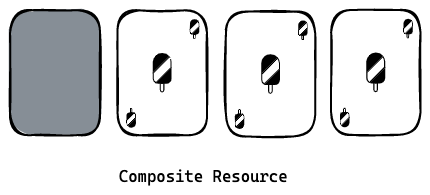
TheFlop Composite will generate 4 private cards.
One of the cards will be “burned” and not shown to anyone. The other three will be placed “face up” – their values will be added to a secret in a shared namespace for all players to view.
Define the Output
We add a test case for the four cards and secret.
tests/theflop/00-assert.yaml:
apiVersion: kuttl.dev/v1beta1
kind: TestAssert
timeout: 30
---
apiVersion: providercards.aaroneaton.com/v1alpha1
kind: Card
metadata:
name: tour-flop-burn
spec:
forProvider: {}
providerConfigRef:
name: tour
---
apiVersion: providercards.aaroneaton.com/v1alpha1
kind: Card
metadata:
name: tour-flop-01
spec:
forProvider: {}
providerConfigRef:
name: tour
---
apiVersion: providercards.aaroneaton.com/v1alpha1
kind: Card
metadata:
name: tour-flop-02
spec:
forProvider: {}
providerConfigRef:
name: tour
---
apiVersion: providercards.aaroneaton.com/v1alpha1
kind: Card
metadata:
name: tour-flop-03
spec:
forProvider: {}
providerConfigRef:
name: tour
---
apiVersion: v1
kind: Secret
metadata:
name: flop-cards
type: connection.crossplane.io/v1alpha1
Define the Input
We already know this is going to have a Claim Name, so we’ll use it.
tests/theflop/00-theflop.yaml:
apiVersion: kuttl.dev/v1beta1
kind: TestStep
commands:
# Install XRDs
- command: kubectl apply -f "${PWD}/package/theflop/"
# Wait for XRD to become "established"
- command: kubectl wait --for condition=established --timeout=20s xrd/theflops.cardgames.aaroneaton.com
---
apiVersion: cardgames.aaroneaton.com/v1alpha1
kind: DealTheFlop
metadata:
name: tour
spec:
tableName: tour
writeConnectionSecretToRef:
name: flop-cards
We don’t need playerName here. The cards will be written to a shared namespace, and a “Dealer” will need to actually create DealTheFlop in that namespace.
Isn’t Provider-Cards the Dealer?
Nope, provider-cards is the deck.
Define TheFlop XRD and Compositions
There are only a few changes to the Definition file.
Mainly, we are declaring 2 connectionSecretKeys instead of 3. (We are not adding 4, because that fourth card is “burned” and not meant to be shown):
package/theflop/definition.yaml:
apiVersion: apiextensions.crossplane.io/v1
kind: CompositeResourceDefinition
metadata:
name: theflops.cardgames.aaroneaton.com
spec:
claimNames:
kind: DealTheFlop
plural: dealtheflops
group: cardgames.aaroneaton.com
names:
kind: TheFlop
plural: theflops
connectionSecretKeys:
- "01"
- "02"
- "03"
versions:
- name: v1alpha1
served: true
referenceable: true
schema:
openAPIV3Schema:
type: object
properties:
spec:
type: object
properties:
tableName:
type: string
description: Name of Table for this Flop
required:
- tableName
The Composition for TheFlop does not include the playerName patch, but it still generates names based on the name of the Claim:
package/theflop/composition.yaml:
apiVersion: apiextensions.crossplane.io/v1
kind: Composition
metadata:
name: theflop-composition
spec:
writeConnectionSecretsToNamespace: upbound-system
compositeTypeRef:
apiVersion: cardgames.aaroneaton.com/v1alpha1
kind: TheFlop
resources:
- base:
apiVersion: providercards.aaroneaton.com/v1alpha1
kind: Card
spec:
forProvider: {}
# this burned card is _not_ added to the connectionSecrets
patches:
- fromFieldPath: spec.tableName
transforms:
- type: string
string:
fmt: "%s-flop-burn"
toFieldPath: metadata.name
- fromFieldPath: spec.tableName
toFieldPath: spec.providerConfigRef.name
- base:
apiVersion: providercards.aaroneaton.com/v1alpha1
kind: Card
spec:
forProvider: {}
connectionDetails:
- type: FromFieldPath
name: "01"
fromFieldPath: status.atProvider.face
patches:
- fromFieldPath: spec.tableName
transforms:
- type: string
string:
fmt: "%s-flop-01"
toFieldPath: metadata.name
- fromFieldPath: spec.tableName
toFieldPath: spec.providerConfigRef.name
- base:
apiVersion: providercards.aaroneaton.com/v1alpha1
kind: Card
spec:
forProvider: {}
connectionDetails:
- type: FromFieldPath
name: "02"
fromFieldPath: status.atProvider.face
patches:
- fromFieldPath: spec.tableName
transforms:
- type: string
string:
fmt: "%s-flop-02"
toFieldPath: metadata.name
- fromFieldPath: spec.tableName
toFieldPath: spec.providerConfigRef.name
- base:
apiVersion: providercards.aaroneaton.com/v1alpha1
kind: Card
spec:
forProvider: {}
connectionDetails:
- type: FromFieldPath
name: "03"
fromFieldPath: status.atProvider.face
patches:
- fromFieldPath: spec.tableName
transforms:
- type: string
string:
fmt: "%s-flop-03"
toFieldPath: metadata.name
- fromFieldPath: spec.tableName
toFieldPath: spec.providerConfigRef.name
Testing TheFlop
Run your tests again to confirm everything is working.
The Turn and the River are also Composite Resources
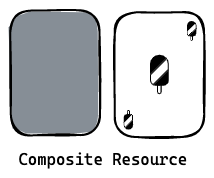

You can now make two more composites.
These are almost identical to TheFlop, except each plays only 1 face-up card instead of 3. Go ahead and create your test cases, XRDs and Compositions for TheTurn (claimName “DealTheTurn”) and TheRiver (claimName “DealTheRiver”).
Make sure your tests are passing:
kubectl kuttl test
...
--- PASS: kuttl (114.33s)
--- PASS: kuttl/harness (0.00s)
--- PASS: kuttl/harness/playerhand (5.87s)
--- PASS: kuttl/harness/theriver (6.46s)
--- PASS: kuttl/harness/theturn (7.30s)
--- PASS: kuttl/harness/theflop (7.47s)
If you get the above output you’re ready to play some Poker!
This is How to Play Poker with Crossplane
Start a cluster, install provider-cards and your composites. Remember to provision a credential secret and your providerConfig.
Round One: Deal the Hand
Create a set of users, or ask several colleagues to join you on a cluster. Make sure each of them can only see their own namespace and the shared “table” namespace.
Every player in the game will create a DealMeIn:
---
apiVersion: cardgames.aaroneaton.com/v1alpha1
kind: DealMeIn
metadata:
name: my-hand
namespace: <player namespace>
spec:
playerName: <player-name>
tableName: <providerConfig name>
writeConnectionSecretToRef:
name: my-cards
Round Two: Deal the Flop
Next, whoever is the dealer will create a DealTheFlop in the shared namespace:
---
apiVersion: cardgames.aaroneaton.com/v1alpha1
kind: DealTheFlop
metadata:
name: tour
namespace: <shared namespace>
spec:
tableName: <providerConfig name>
writeConnectionSecretToRef:
name: flop-cards
Players can investigate TheFlop by running:
kubectl get secret flop-cards -n <shared namespace> -o yaml
Players may bet by another means. When everyone has folded or called…
Round Three: Deal the Turn
The dealer creates a DealTheTurn in the shared namespace:
---
apiVersion: cardgames.aaroneaton.com/v1alpha1
kind: DealTheTurn
metadata:
name: tour
namespace: <shared namespace>
spec:
tableName: <providerConfig name>
writeConnectionSecretToRef:
name: turn-card
Players can investigate TheTurn by running:
kubectl get secret turn-card -n <shared namespace> -o yaml
Players bet again. When everyone has folded or called…
Round Four: Deal the River
The dealer creates a DealTheRiver in the shared namespace:
---
apiVersion: cardgames.aaroneaton.com/v1alpha1
kind: DealTheTurn
metadata:
name: tour
namespace: <shared namespace>
spec:
tableName: <providerConfig name>
writeConnectionSecretToRef:
name: river-card
Players can investigate TheRiver by running:
kubectl get secret river-card -n <shared namespace> -o yaml
How do I stop someone from cheating?
RBAC Controls and “Pit Bosses.”
Your players should only have the ability to create the Claims for the Composites we are building. Since the actual cards are Cluster-Scoped (like all managed resources), working directly with cards requires admin privileges. Your Players should not be admins. They only have access in their own namespace and the shared “table” namespace.
Meanwhile, cluster administrators can see every card at the table. So if a player somehow manages to pull a card directly the cluster administrators would see it happen and intervene.
Let’s get back to the demo.
An Imperfect Endgame
Now it is time for everyone left to show their cards.
Crossplane Compositions really aren’t intended for “sharing” information. The design originally assumed that everyone who created infrastructure wanted to own that infrastructure and there was little need for community access.
In practice, teams often create message queues or share data buckets to facilitate communication. When this happens the owning team wants to share connection secrets into another team’s namespace.
I’ve opened an issue on the crossplane repo to provide this functionality. This has some significant security implications, of course.
For now, here is my imperfect “workaround” that will allow the game to complete:
Grant The Dealer access to edit the PlayerHands.
When everyone has called, the dealer will edit the hand of everyone still in the game, changing the name and target of the name and namespace of the writeConnectionSecretToRef field.
If The Deal needs to know the name of a player, it is shown in the crossplane.io/composite annotation on any of a player’s cards.
If the annotation on playerone’s card is “crossplane.io/composite=my-hand-blm2v”, then:
---
apiVersion: cardgames.aaroneaton.com/v1alpha1
kind: PlayerHand
metadata:
name: my-hand-blm2v
spec:
playerName: <player-name>
tableName: <providerConfig name>
writeConnectionSecretToRef:
name: playerone-cards # edited to player's name
namespace: <shared namespace> # edited to shared namespace
Now… can we make it play Blackjack?
